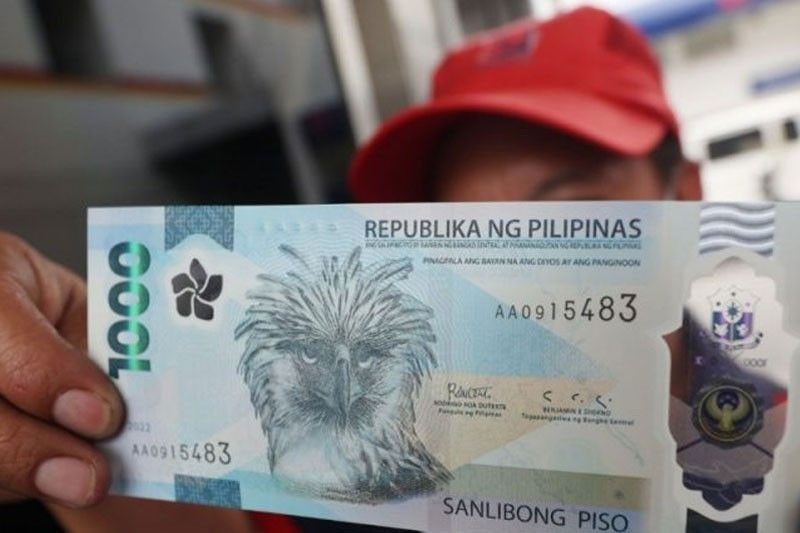Shift to polymer banknotes to result in P2.4 billion savings

MANILA, Philippines — The Bangko Sentral ng Pilipinas (BSP) will save as much as P2.4 billion in production costs in the ongoing shift to polymer from paper-based banknotes.
During a recent briefing by the Senate Committee on Banks, Financial Institutions and Currencies, BSP Deputy Governor Mamerto Tangonan said that estimates of potential savings from longer bill lifespan stood at P1.26 billion to P2.4 billion based on actual 2021 bank withdrawals of new P1,000 banknotes from the central bank.
“The longer lifespan of polymer banknotes would translate into lower replacement costs, hence higher production cost savings,” Tangonan said.
Tangonan said polymer banknotes lasts two and a half times to four times longer than paper-based banknotes.
Higher savings, Tangonan explained, would redound to higher earnings for the BSP, half of which accrues to the national government in the form of dividends.
“Higher dividend remittance to national government can then be used to fund government’s economic and social programs,” the BSP official said.
These include the flagship tuxy buying special project of the Philippine Fiber Industry Development Authority (PhilFIDA) that aims to produce higher quality abaca, as well as double farm and income productivity.
Others include funding more hospital beds and classrooms, higher number of household beneficiaries from 4Ps program, mass housing units, among others.
The circulation test of the 100 million pieces of P1,000 polymer banknotes is ongoing alongside the existing P1,000 paper banknotes.
Polymer-based banknotes, Tangonan explained, are more difficult to counterfeit, more hygienic and sanitary, more durable, environment-friendly, and more cost-effective.
According to Tangonan, the country’s abaca industry will continue to prosper even with the shift to polymer banknotes from paper bills amid growing demand for natural fibers in the global market.
Tangonan said that the circulation test of 500 million pieces of P1,000 polymer banknotes are estimated to affect just 0.2 to 0.4 percent of abaca farming jobs or 210 to 481 jobs, and 0.1 to 0.2 percent of abaca export revenues or from P8.5 to P17 million.
“The estimates were based on the assumption that abaca suppliers have no alternative markets that is, it is a do-nothing scenario. However, the BSP fully recognizes the vast potential and growth opportunities given the large global demand,” Tangonan said.
The BSP official explained abaca farmers do not directly supply abaca to the central bank for production of cotton-abaca paper bills, but supply to processors and exporters who sell abaca pulp to manufacturers of specialty paper abroad.
“The share of the estimated abaca content of the Philippine banknotes to total volume of abaca fiber production in 2020 is just around two. Meanwhile, the share of abaca content of our banknotes to abaca export earnings is less than two percent at its peak. That is, when the BSP had multi-year procurement,” he said.
Senate Minority Leader Aquilino Pimentel III is looking into the plan of the BSP to shift to polymer from paper-based banknotes.
For her part, Sen. Pia Cayetano said polymer-based bills are non-biodegradable as opposed to paper banknotes that use natural materials.
“When we look at the sustainability picture, we always have to take different factors into concern. It may, in fact, use less water, may have a smaller carbon footprint, but it will not biodegrade. It will still be there and it is a product we created and will stay there forever, as opposed to abaca and cotton,” Cayetano said during the inquiry.
Cayetano, who chairs the Senate Committee on Sustainable Development Goals, Innovation and Futures Thinking, also questioned the BSP’s claim that polymer bills use less water and can be recycled into chairs and tables.
- Latest
- Trending






























